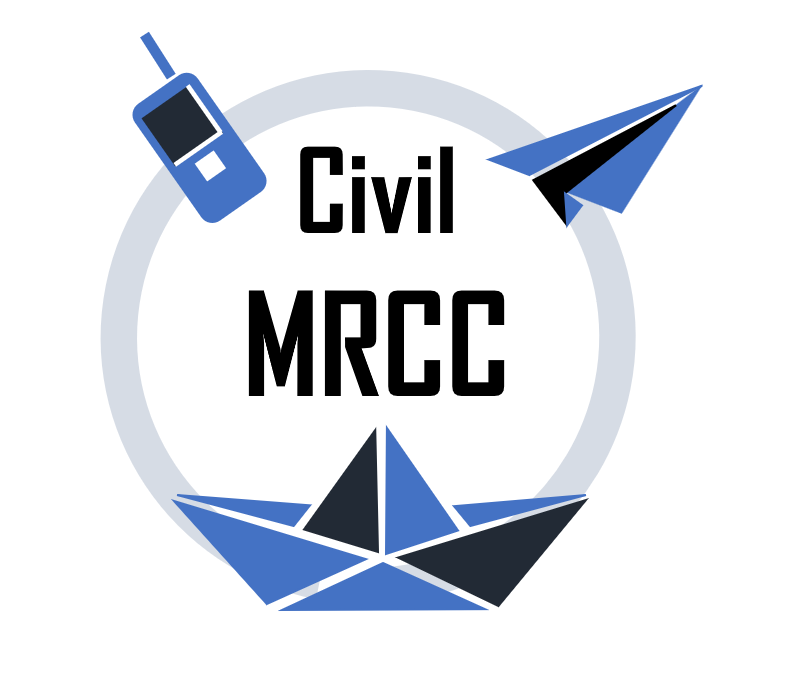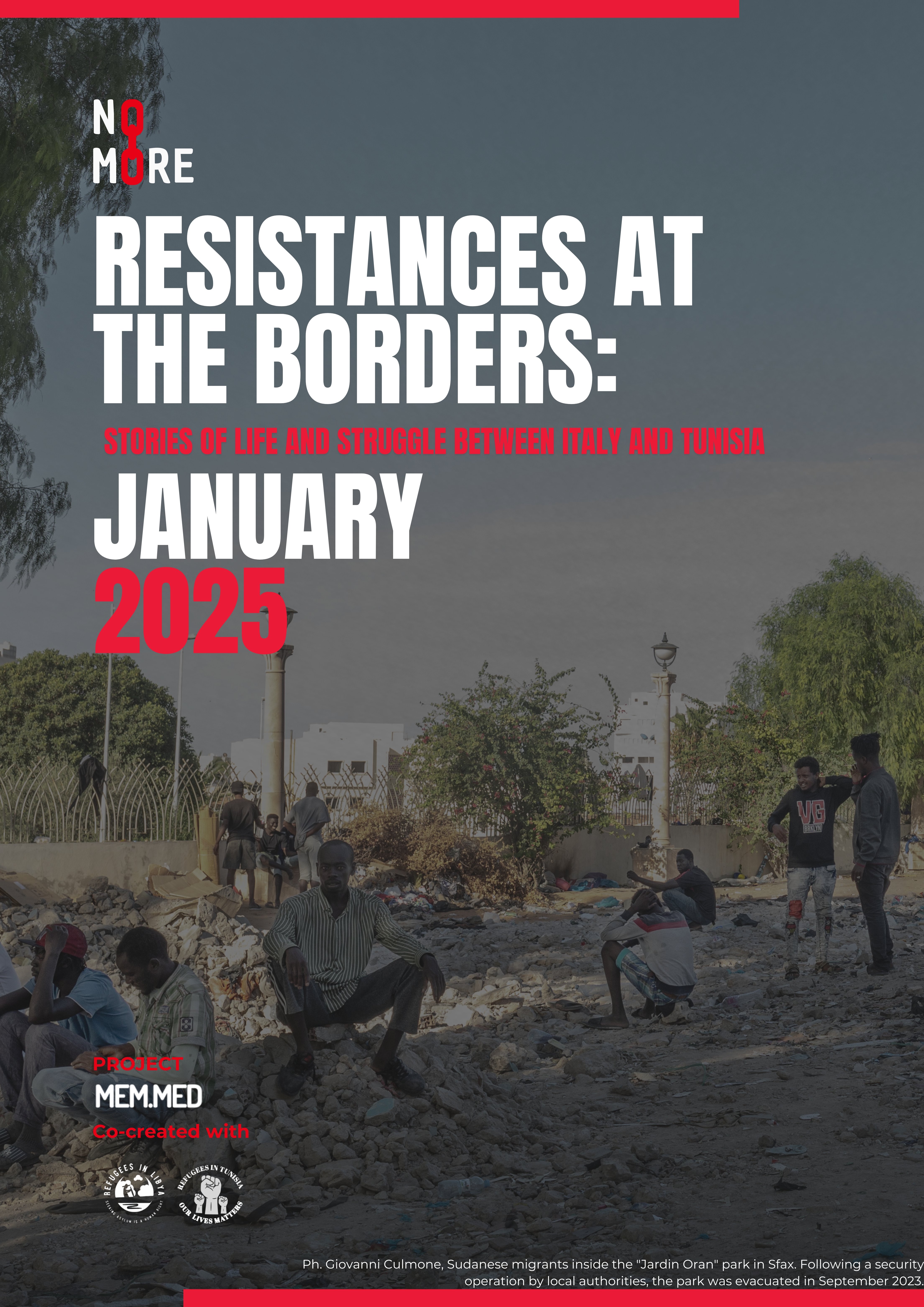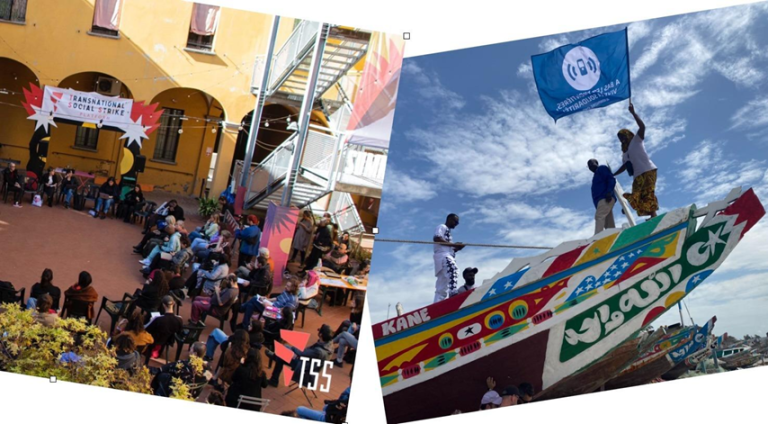Wednesday, April 10th – Favaloro Pier at 9 p.m.
Testimony from a Maldusa activist
That evening, in many parts of the world Eid, the end of Ramadan, was being celebrated. Even in Lampedusa, among those who are not Muslims, there was a sense of celebration and carefreeness. Meanwhile, the island was starting to wake up from its winter slumber, with the last songs of the Sanremo festival resonating from all the bars and restaurants, spreading to every corner of the island.
A message arrives: at 8:30 p.m., disembarkation at the Pier, there’s a shipwreck, there is also the body of a little girl.
Another arrival, another shipwreck.
In the past few days, I had not been able to attend any arrival so although my plans were to celebrate Eid, I offered my availability and quickly got ready to go to the Pier. We met there in front of the gates, at the beginning of the military area. For none of us it was the first landing or even the first shipwreck. With a sort of naive protective lightness, we approached the landing point. We saw the lights of the patrol boat still far away in the darkness of the sky merging with that of the sea. Lights that contrasted with those of the mainland, coming from the houses of the village or from Via Roma, the main street of the island, from which only distant echoes of sounds and voices could be heard.
As the patrol boat got closer and closer, we began to see ambulances arriving. Not one as usual, but at least two or three that stopped at the beginning of the pier. The air started to weigh heavily, people with worried faces running around and exchanging quick communications. We understood that the situation was different and the tension rose.
The Italian Coast Guard patrol boat approached the Pier and began to moor. Usually, we cannot get close to the disembarkation area, so with our necks stretched out, we remained distant, ready with glasses of hot tea and rescue blankets in our hands. As always, all the authorities were present, each in their own uniforms: State Police, Frontex, Red Cross, UNHCR (United Nations of High Commissioner for Refugees), and EUAA (European Union Agency for Asylum). In addition to the medical staff from Usmaf (Maritime, air and border health offices) and ASP (provincial health company) of Palermo.
They asked us for thermal blankets and some of us walked over to that part of the pier, right next to the now moored patrol boat. My memories at this point are a bit blurry. I remember people running with battered stretchers toward that area, usually inaccessible to us, as if another imaginary but tangible border had been created, inserted within a place, the Pier of Lampedusa, deliberately marginalized and invisibilized.
The disembarked people did not arrive, the usual orderly queues were not formed, as it happens with every arrival. Our companions didn’t return to us, so we decided to approach.
Among the glaring lights of the patrol boat, on one side, I saw people trying to lift the only stretcher with wheels. Lying on it, a man was seized by convulsions, his body moving uncontrollably without them being able to hold him still to run toward the ambulances. Beyond some Red Cross workers, an expanse of bodies appeared. Bodies on the ground, motionless, wrapped in gray fleece blankets and rescue blankets.
There was disorganization, astonished people, authorities immobilized in front of this terrible scene, and people trying to do something. I got closer to a heap of blankets, the faces of these people were barely visible. Many of them laid there, abandoned to themselves. The ground medic told me: “We need to make sure they stay with us, shake the bodies, try to create warmth and make sure they keep their eyes open”. Time stood still, the emotional part of the brain stopped functioning, and the practical one kicked in.
I approached a pile of blankets and saw that there was a body underneath, cold and immobile. I uncovered his face and began to talk to him. His gaze was completely absent. He looked at me but it was as if he didn’t see me, didn’t see anything. He didn’t speak and didn’t move. I started doing as the doctor said while communicating to him that we were here, we were together and “s’il vous plaît, mon ami, les yeux ouverts.” (please, my friend, your eyes open). From the blankets, I felt the chill coming from his body, completely wet and with soaked clothes smelling of gasoline. He couldn’t, his eyes kept closing and at one point they rolled backwards.
At that moment, two people arrived with a wheelchair. The goal was to take all these defenseless people to the medical station recently set up on the other side of the pier. It was warm there, with heating, and people could shelter from the strong wind of that evening and the cold of the night.
With extreme effort and the help of others, after a couple of attempts, we managed to lift the heavy and exhausted body of this person and put him on the wheelchair. He was really young. His feet kept slipping to the ground and his body kept falling to one side. Two of us began pushing the wheelchair. The floor of the Favaloro Pier is full of holes to avoid and cables to provide electricity to the moored Guardia di Finanza boats, so it was necessary to lift the wheelchair to prevent it from tipping over.
We reached the small station room, in a hurry to bring him to an enclosed place as soon as possible, but with the slowness due to his situation and the precarious condition of the pier. Inside the room, there was a guy left alone sitting on the bench, with his torso and head forward. He was in a semi-conscious state, but at one point, he whispered “eau” (water). The person I was with rushed to the beginning of the pier to get a bottle of water. They were all in a state of dehydration.
Meanwhile, it was necessary to move the guy from the wheelchair to the bench. There were only two wheelchairs available, so it was necessary to free it as soon as possible to transport other people.
It was all surreal and this situation is unacceptable.
Even if I don’t have any medical competence, I remained alone with the two guys, lying on themselves. In the meantime, I understood that some people were being transported by an ambulance to the Territorial Emergency Point (PTE), or outpatient clinic, managed by the ASP of Palermo. There is no real hospital in Lampedusa, but these people, who in total will be six, were in an even more critical condition than all the others lying on the ground.
This running from one side of the pier to the other was a dynamic repeated several times over the following hours. Unconscious bodies, agonizing bodies, also carried by weight by the people there. In addition to the one stretcher with wheels, there were two more that had to be raised and carried by weight. In the chaos of disorganization, amidst shouts and races against time, scenes appear in my memories where the wheelchairs almost tip forward because of the electrical cables or holes in the floor, people bustling around like crazed pawns trying to cope with an undefeatable situation, physical efforts in an attempt to move these heavy bodies.
My will was not to stop, I felt that in the moment I did, a sense of despair and absolute powerlessness would overwhelm me. Sitting next to these bodies, sometimes I looked around, and for a handful of seconds, any noise disappeared, without me being able to conceive what was happening.
Despondency turned into anger the moment these raw images, reappearing in my mind, were rationally inserted into the broader picture of which they are part of.
That same evening, from behind the central body of the moored patrol boat, a voice was suddenly heard addressing those on land: “Could someone help me? Among these bodies, maybe there is someone still alive.” Later, reconstructing the facts, it was discovered that, during the journey of the patrol boat CP308 towards the shores of Lampedusa, seven people rescued from the sea had died of hypothermia. All were very young guys and a six-year-old girl who died of drowning.
Among the lifeless bodies, there were a few conscious people in a clear state of shock and hypothermia.
In the face of such a rough scenario that even many professionals are now “accustomed” to the banality of evil at the Lampedusa’s pier, the Frontex staff still intended to show their indifference towards the people they were dealing with, demonstrating how border control and surveillance can only turn into monstrous practices – albeit all too human. With a questionnaire in hand, an employee of the European Agency approached the few people who could barely stand on their own.
“Where did you depart from? How many of you? How much did you pay? How much fuel did you have on board? Who was driving the boat?”
The questions cut through the heavy air of the pier.
Such pre-investigative practices by Frontex personnel are routine but completely illegitimate. First and foremost, in terms of timing. Whether or not a monitoring officer is present, they interrogate people as soon as they disembark, without specifying what authority they represent and the reasons and purposes of the questions asked. They subject them to questioning at a moment of confusion and vulnerability like a disembarkation, even before they have received basic necessities and legal information about the Italian international protection system. In fact, gathering information about the crossing is outside any legal safeguards for those interrogated, even though the answers may serve as evidentiary proof and may be directly linked to subsequent police operations.
The search for scapegoats for the deadly policies for which European authorities are responsible, in this context, has proven even more aberrant and dehumanizing. Protests from some of us only elicited the robotic and arrogant response from the person in charge at the time, “What my colleague is doing is much more useful and important than anything the rest of you are doing on the pier.”
Meanwhile, more and more people had reached the other side of the pier. Most of them were unable to speak and could not move their bodies independently.
Another surreal situation had arisen: the medical room was small, no more than 10 square meters, and all these people would not fit. That’s why I was suggested to make a guy sit on the floor next to the entrance door, who, in addition to being hypothermic and in a visible state of shock, had burns on his legs. Inside the room, there were six people sitting on the floor or on the bench. In the middle of the room, there were four doctors focused on the body of a guy, probably in his twenties, who was not breathing. He was unconscious. They performed cardiopulmonary resuscitation maneuvers, but he did not respond. So they started with the defibrillator. They tried to resuscitate him for almost an hour, only to confirm his death afterward.
Meanwhile, on the bench, there were two women who had been stripped to wear the white overalls. They were shivering so much from the cold that they couldn’t hold a glass of hot tea. One of them was asking anyone passing by where her daughter was, she didn’t know where she was and wanted to find her. In this scenario, these two women started asking each other how many children they had and whether they knew where they were. The other woman said she had seen her daughter drowning, but didn’t know anything about the other two.
That night no children arrived at the Favaloro Pier. There will be 9 coffins in the Lampedusa cemetery. All very young people, including a small white coffin of the 6-year-old girl.
More defenseless people kept arriving, but there was no more space in the medical room. So they were laid on the cold concrete in front of the room, waiting to be taken to the Red Cross bus with destination Hotspot.

Transfer by ferry from the Commercial Pier (Lampedusa) to Porto Empedocle (Agrigento) – May 2024
22 survivors, 9 bodies and 15 missing.
Since Sunday evening, these people had been at sea, embarked on an iron boat and arrived at the Favaloro Pier on Wednesday evening. They had departed from Tunisia, near Sfax. They came from Mali, Burkina Faso, Guinea Conakry and the Ivory Coast.
A woman survived two shipwrecks during the same crossing. She was rescued at sea by the people on the iron boat before it sank too. She had been at sea for hours and was the sole survivor of her boat. Another 45 people are missing from the first boat.
What happened that evening was violence, the result of an institutional will that, with different nuances and dynamics, repeats itself every day for years. This lack of preparedness is the final equilibrium of a systemic operation intended to prioritize the construction of confinement spaces rather than implementing tools and infrastructure to provide a worthy and adequate response to the phenomenon of migration.
It is the political will to maintain the management of arrivals in Europe as an emergency.
It is unacceptable that these shipwrecks continue to occur, that surveillance tools are implemented to prevent people from reaching Europe, and yet, a boat like this one remains adrift for almost four days in Maltese search and rescue waters at the mercy of the waves and bad weather. Italian governments continue undeterred to strengthen collaborations and donate patrol boats to the so-called Coast Guards of North African coastal countries, which carry out continuous pullbacks and deportations while shipwrecks, more or less visible and caused by this militarization of the sea, continue to return lifeless bodies.
It is not an emergency. It is the choice of an emergency response by Italy and the European Union. After all these years of media and government narratives, of law enforcement implementation and militarization, we cannot continue to witness these massacres.

In a border management system where everything is confined to certain places and spaces, where everything is planned mechanically like an assembly line, it is essential to provide an adequate response to events like this. The Favaloro Pier is the first example of a long list of conscious neglect and intentional unpreparedness towards people who want to reach Europe. The insufficient presence of medical and psychological personnel, the inadequate structural condition of the pier, and the lack of tools and infrastructure are evidence of a clear underlying political choice.
Lampedusa, September 2023. Picture: Maldusa
Website – https://www.maldusa.org/en/



